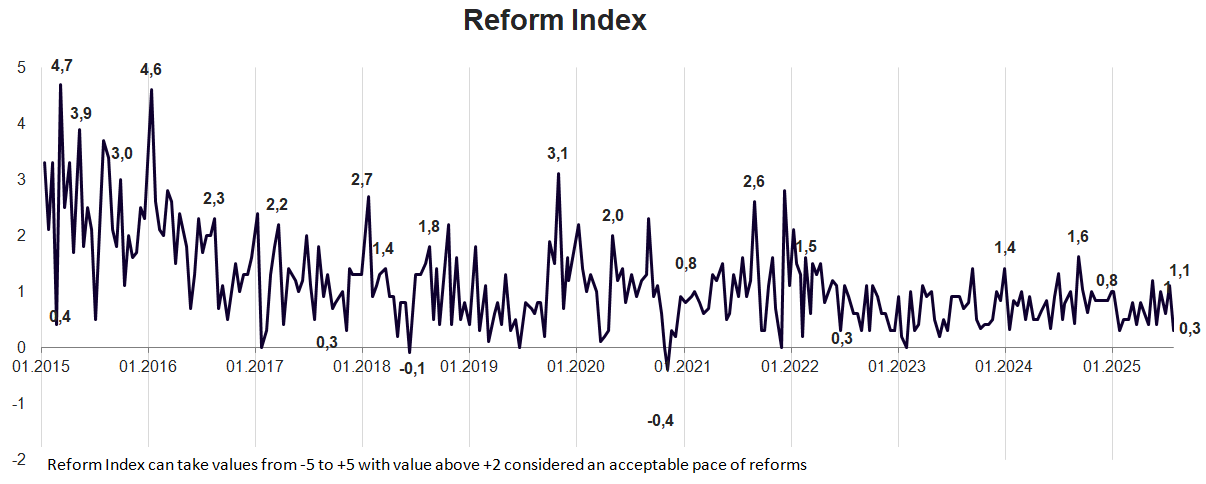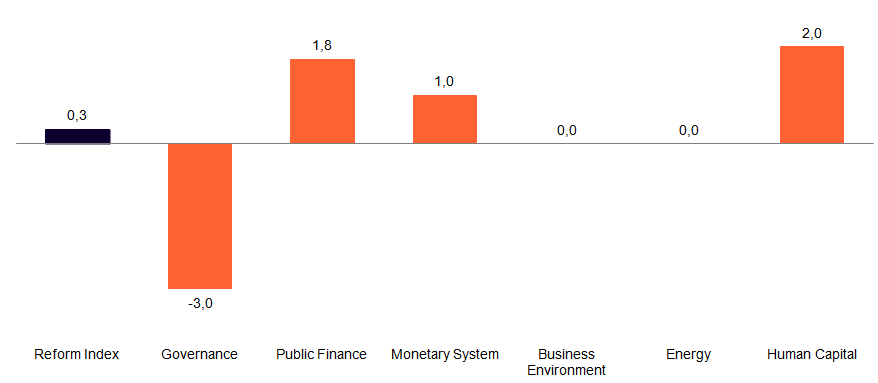Issue 269 of the Reform Index records, for the first time in a long while, a major counter-reform—a law restricting the independence of NABU and SAPO. We have already reported on this development, which received a combined score of –4.5 points.
Still, there were positive decisions. Two measures earned +2 points each: the law on multiple citizenship and the ratification of the agreement establishing a special tribunal to investigate Russia’s crimes against Ukraine. In total, issue 269, covering July 14-27, includes 10 measures. The overall Index score is 0.3 points (on a scale from –5 to +5), down from 1.1 in the previous issue.
Graph 1. Dynamics of the Reform Index

Graph 2. Values of the Reform Index and its Components in the Current Assessment Round

Creation of a special tribunal for Russia’s crimes against Ukraine, +2 points
On July 15, 2025, the Verkhovna Rada ratified an agreement between Ukraine and the Council of Europe to establish the Special Tribunal for the Crime of Aggression against Ukraine. The Tribunal is intended to investigate and prosecute senior officials of the aggressor state.
The Special Tribunal may conduct trials in absentia, allowing it to issue verdicts against high-ranking officials of Russia — and potentially also Belarus and North Korea — even without the defendants present. The Tribunal will be able to impose severe penalties, ranging from imprisonment of up to 30 years to life sentences. Financial sanctions may also be imposed, including fines (depending on the crime), confiscation of property and assets of convicted persons, and compensation for damage caused by the aggression.
The Tribunal will operate under the auspices of the Council of Europe and complement the work of the International Criminal Court. Proceedings may run in parallel, and if a defendant is transferred to the ICC, the Tribunal’s process will be suspended for the duration of the ICC trial.
Information about the Reforms Index project, the list of Index experts and the database of the regulations assessed are available here.
Expert commentary
Onysiia Syniuk, legal analyst at the ZMINA Human Rights Center:
“The signing of the Agreement on establishing the Special Tribunal, as well as the Tribunal’s Statute, and their ratification by Ukraine are important steps toward achieving justice and ensuring accountability for the crime of aggression against Ukraine. Political declarations of support for Ukraine have been translated into concrete provisions — on the Tribunal’s international legal personality, it’s funding through the Enlarged Partial Agreement, its seat, and its cooperation arrangements.
The approved full text of the Statute also provided answers to numerous questions regarding the Tribunal’s proceedings. In particular, the definition of the crime of aggression is based on the wording contained in the Rome Statute of the ICC; the “trio” (the head of state, head of government, and minister of foreign affairs) can be convicted by the Tribunal, including for actions they committed while in office, and even in absentia. However, only once they no longer hold office. In absentia proceedings against other potential defendants may be initiated at any time, regardless of their official status.
It is also important that the Tribunal’s jurisdiction is not limited to representatives of the Russian Federation — it extends to any individuals suspected of committing or participating in the crime of aggression. This means the Tribunal may, given sufficient evidence, hear cases against representatives of other states (for example, Belarus). The Statute also sets the limits of punishment: imprisonment for up to 30 years, or life imprisonment in cases of particular gravity and circumstances related to the convicted person. Fines and confiscation are also provided for — covering funds, assets, and property obtained directly or indirectly from the crime of aggression.
Another essential provision stipulates that amnesty for individuals under the Tribunal’s jurisdiction will not bar proceedings against them. This is especially significant in the context of ongoing political negotiations—responsibility for the crime of aggression cannot be subject to concession.”
Law on multiple citizenship, +2 points
On July 15, 2025, the President signed a law that opens the way to multiple citizenship. The law officially allows dual (and even multiple) citizenship, provided that the other state is included on a list determined by the Cabinet of Ministers—taking into account its EU membership and its position on sanctions against aggressor states. This is especially important for people who were forced to go abroad because of the war.
Multiple citizenship is also recognized for foreigners who acquire Ukrainian citizenship. For example, under a simplified procedure, individuals who serve under contract in the Armed Forces of Ukraine, the National Guard, or the State Special Transport Service, as well as relatives of fallen defenders, may apply for citizenship after just one year of service. In addition, a foreigner whose relatives lived or were born in territories that historically belonged to Ukraine before 1991 may become a citizen of Ukraine. In such cases, the applicant must know the basics of the Constitution and the history of Ukraine and be proficient in the state language.
The law does not apply to citizens of Russia, Belarus, or states that do not recognize Ukraine’s territorial integrity. Moreover, voluntary acquisition of citizenship of an aggressor state, service in its army, participation in occupation authorities, or taking part in hostilities on the aggressor’s side may result in loss of Ukrainian citizenship. However, this is not automatic. As before, the President makes the final decision on deprivation of citizenship based on a submission from the State Migration Service or other competent authorities.
Expert commentary
Oleh Ivanov, analyst at the NGO Vox Ukraine:
“The adopted law introduces the possibility of multiple citizenship for certain categories of people — primarily members of the diaspora from ‘friendly countries,’ as determined by the government. They may obtain Ukrainian citizenship without being required to renounce their previous one. Ukrainians who wish to acquire another citizenship do not automatically lose Ukrainian citizenship, but they must notify the authorities of their new citizenship. However, in certain cases, they may be deprived of Ukrainian citizenship. First, this is possible if they voluntarily acquire the citizenship of an unfriendly state (Russia, Belarus). Second, deprivation is possible if they voluntarily acquire any other citizenship after reaching adulthood.
At the same time, Russians (and Belarusians) who have lived in Ukraine for decades cannot benefit from the simplified procedure. To obtain Ukrainian citizenship, they must renounce their Russian citizenship by returning to their country of origin and completing the required procedure there. Only those facing persecution in Russia — for example, Russians fighting on Ukraine’s side — may obtain Ukrainian citizenship, provided they declare their renunciation of their previous citizenship.
Thus, the procedure for acquiring Ukrainian citizenship by Russians and Belarusians who have long lived in Ukraine but for various reasons do not wish or are afraid to return to their homeland requires improvement — possibly through government by-laws.”
Reform Index from VoxUkraine aims to provide a comprehensive assessment of reform efforts by Ukraine’s authorities. The Index is based on expert assessments of changes in the regulatory environment in six areas: Governance, Public Finance, Monetary system, Business Environment, Energy, Human Capital. Information about the Reforms Index project, the list of Index experts and the database of the regulations assessed are available here.
Attention
The author doesn`t work for, consult to, own shares in or receive funding from any company or organization that would benefit from this article, and have no relevant affiliations



